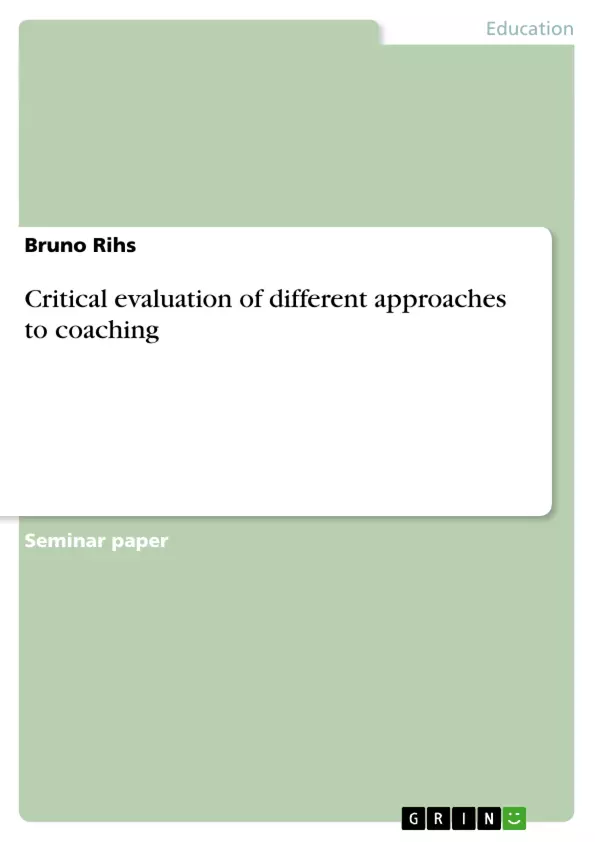In this assignment, I would like to reflect on and develop an understanding of different approaches to coaching and subsequently try to compare these approaches among themselves for the purpose of evaluation.
Which approach helps the best to reach a specific goal? Money and time being a constraint in almost all situations, it is reasonable to look for evidence concerning best practices. Human mind is known to get influenced quite easily by what it is subjected to. For instance, if we look at a description of one approach, we easily get the impression that this is the best and the most effective one. All the same, if we read about another approach, we might believe that the other one is an even better option. Debates like these are an ongoing process in various fields. In the field of teaching for example there has been a long lasting debate about which method is the best. Is it the instructional approach or the group work style or else the open space approach? In therapy, similar questions are asked between different schools. Each one claims to be the best and every one can prove it with case studies or sometimes with empirical pieces of research.
What works? Many different models of thought have been developed on many different roots and theories. Depending on the underpinning anthropology we find different approaches to the interpretation of coaching. Some emphasize a more rational approach, we could call it the Head-level, some the level of feelings and others focus on Intuition. Alike the three dimensions in space (length, breadth, height) there is a need of all three. If one is completely missing, the result is nill.
With the tendency to measure and to analyse all appearances in the world (coaching included) we always react on the surface of the world. We are in danger to neglect the immeasurable aspects like feelings, attitudes and values, culture and norms. Different and contrasting perceptions of the reality are possible and correct. The either-or mentality is no longer valid and must be replaced by the “as well as” approach. Between the sky and the earth there exist unexplainable things of which we probably will never know how they work. Nevertheless we can use different approaches.
Inhaltsverzeichnis (Table of Contents)
- Preface
- Overview of different approaches to coaching
- Psychodynamic approach
- Behavioural approach
- Humanistic psychology approach
- How to characterize models and perspectives
- Two exemplary approaches
- A closer look at Nancy Klines process model
- A closer look at the technique driven NLP
- Two exemplary approaches
- Conclusion
- References
Zielsetzung und Themenschwerpunkte (Objectives and Key Themes)
This assignment aims to critically evaluate different approaches to coaching by exploring their theoretical underpinnings, comparing their effectiveness, and considering the impact of different conceptions of human nature on coaching practices.
- The impact of different anthropological views on coaching approaches
- Comparison of the strengths and weaknesses of various coaching models
- The importance of understanding the underlying psychological principles of coaching
- The role of observation and introspection in coaching
- The significance of the coach-coachee relationship in achieving successful outcomes
Zusammenfassung der Kapitel (Chapter Summaries)
- Preface: This chapter introduces the assignment's focus on examining different coaching approaches and comparing their effectiveness. It emphasizes the importance of considering different conceptions of human nature in coaching.
- Overview of different approaches to coaching: This chapter presents an overview of three major approaches to coaching: psychodynamic, behavioural, and humanistic psychology. The chapter explores the philosophical underpinnings of each approach, highlighting their distinct conceptions of human nature and how they influence coaching practices.
- How to characterize models and perspectives: This chapter delves deeper into two specific coaching models: Nancy Kline's process model and the technique-driven NLP. It analyzes the different anthropological assumptions underlying these models and their implications for the coaching process.
Schlüsselwörter (Keywords)
Key concepts explored in this paper include coaching approaches, psychodynamic, behavioural, humanistic psychology, anthropological assumptions, process models, technique-driven coaching, Nancy Kline, NLP, coach-coachee relationship, and human nature.
Frequently Asked Questions
What are the main coaching approaches discussed?
The paper evaluates the psychodynamic, behavioural, and humanistic psychology approaches to coaching.
How does anthropology influence coaching?
Different anthropological views or conceptions of human nature determine whether a coach focuses on rational thought, feelings, or intuition.
What is the difference between Nancy Kline's model and NLP?
Nancy Kline's model is characterized as a process model, whereas NLP (Neuro-Linguistic Programming) is viewed as a technique-driven approach.
Why is the coach-coachee relationship important?
The relationship is a critical factor in achieving successful outcomes, as it bridges the gap between theoretical models and individual needs.
What is the "as well as" approach in coaching?
It is an approach that moves away from "either-or" mentalities, integrating measurable facts with immeasurable aspects like values and culture.
- Quote paper
- Bruno Rihs (Author), 2007, Critical evaluation of different approaches to coaching, Munich, GRIN Verlag, https://www.grin.com/document/85717



